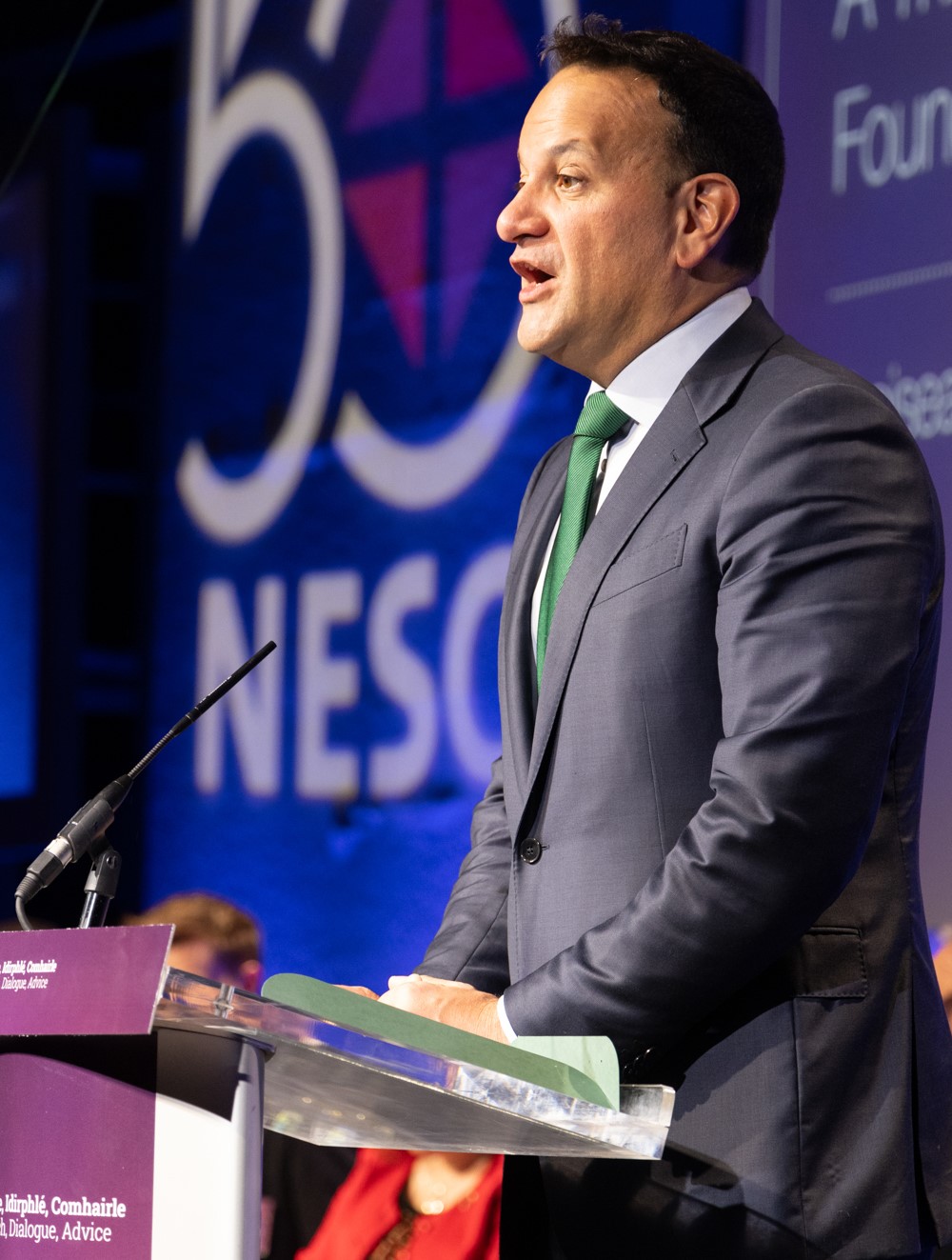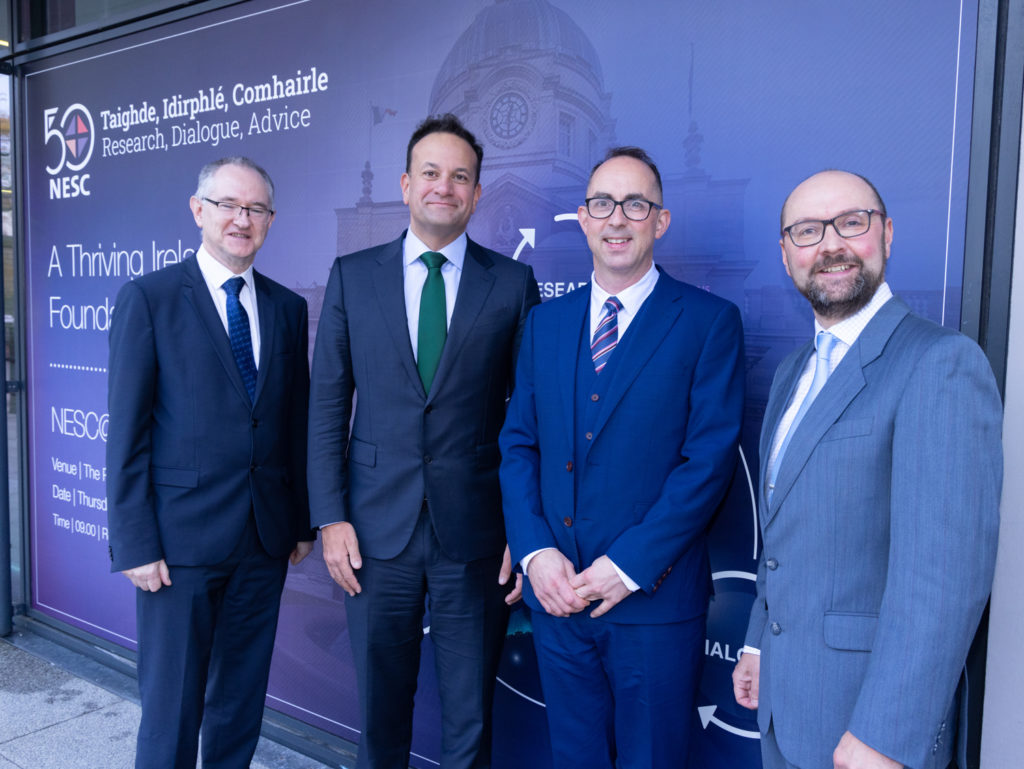You are here: Home > News & Events > NESC@50 – Taoiseach Says NESC’s Unique Approach Is Essential in an Age of Misinformation and Polarisation
NESC@50 – Taoiseach Says NESC’s Unique Approach Is Essential in an Age of Misinformation and Polarisation
- 11 December 2023
- Topics: NESC@50
- Types: Events News

Speech by Taoiseach Leo Varadkar T.D. for NESC@50 Conference
The Printworks, Dublin Castle
Thursday 23 November 2023
Distinguished guests, ladies and gentlemen, good morning.
Thank you all for joining us as we celebrate NESC’s 50th anniversary together.
As the most recent of 11 Taoisigh that NESC has advised over its longstanding service, I’d like to reflect on its role over the past 50 years.
Establishment of NESC
When NESC was established in 1973, Ireland was facing deep economic and social challenges.
Overcoming these challenges required greater research than what we had available at the time, as well as an improved dialogue between government and civil society.
Taoiseach Liam Cosgrave, a man I greatly admire for his quiet, understated determination, courage and fortitude, recognised this need and established NESC to fill that void.
NESC was and still is, an opportunity for policy makers and representatives of wider society, to ‘stand back’ and consider the most pertinent challenges facing the country in the round and problem-solve together.
In announcing its establishment, the Minister for Finance, Richie Ryan, stated its task as ‘advising the Government on the development of the national economy and the achievement of social justice’.
He went on to say that the Council would be representative of the ‘three great economic interests, the employers, organised workers and farmers’ – what later became known as pillars, unfortunately!
Much has changed since then, not least the expansion of the number of pillars to include the community, voluntary and environmental sectors.
1973 v 2003
In 1973, the population stood at 3 million people, the average life expectancy was 71, and a quarter of the workforce was engaged in agriculture.
Ireland was about to embark on a new journey in its history as it joined the European Economic Community.
Today we see the results of that decision and the incredible shift it brought about in our economy and society.
The country’s population now stands at well over 5 million people, the average life expectancy is 83 and we have full employment, with an economy spread over a diverse range of sectors.
While we have much to do, the stark differences between the Ireland of 1973 and the Ireland of 2023 highlights how Ireland has ‘thrived’ over the last 50 years.
The first NESC report details a net gain of 6,000 jobs in 1973. Its third report a year later documented a worsening economic situation, with consumer prices rising by 18% year-on-year.
Compare that today, with 88,000 jobs created in the last year alone and a €14 billion budgetary package to help with the cost of living amid easing inflation.
Importance of NESC’s work
Recalling our history is useful not only in helping to appreciate the present, but also in understanding that precarious circumstances can be turned around if diagnosed correctly and appropriate action undertaken.
The approach of NESC, where research and meaningful dialogue are intertwined, has been extremely effective in helping problem-solve complex policy issues.
It has allowed for challenges to be reframed, a common understanding of issues to be shared among stakeholders, and alternative policy solutions to considered.
The importance of this approach is as great today as it was in 1973 and, if anything, the need for NESC’s unique contribution to the policy landscape has only grown, as misinformation and polarisation have grown more prevalent.
We live in an age where information is abundant, but wisdom is scarce. Inundated with misinformation, increasingly divisive politics, and ever-polarising opinions.
Objective analysis and evidence-informed policymaking are essential.
NESC reports over the years
While time constraints prevent me from listing them all, I would like to mention a few major reports that have significantly contributed to our economic, social, and environmental policy.
In 1982, NESC undertook the first in-depth assessment of Ireland’s enterprise policy. The report highlighted that Ireland was not fully harnessing the potential of foreign direct investment and that domestic Irish enterprises were not receiving adequate assistance.
NESC’s report advised the Government to introduce a more targeted approach to attracting foreign direct investment and shift the focus towards robust export-orientated businesses. The wisdom of this policy advice is evident across Ireland today.
The economic research, dialogue, and advice provided by NESC proved invaluable for subsequent initiatives, including the 1984 White Paper on Industrial Policy and the Industrial Development Act or IDA Act of 1986.
Outside of the economic sphere, one of NESC’s most important contributions is its ability to merge the economic, social, and environmental aspects of policy.
This holistic approach to policy advice is evident in its 2005 Developmental Welfare State (DWS) report, one of the Council’s most influential publications.
The DWS report stands out as an exemplar of NESC’s unique approach, emphasising the interconnectedness of economic and social policies with positive economic performance bolstering effective social policy and vice versa.
NESC acknowledged that Ireland’s social welfare system was primarily focussed on income support and advocated for a profound enhancement of services that would include education, childcare, and employment services, amongst others.
This vision laid the groundwork for Ireland’s welfare state that we know today. As a former Minister for Social Protection, I had the privilege of witnessing the lasting impact of NESC’s recommendations on the social fabric of our country.
Environmental Policy
Another aspect of NESC’s work, is its ability to take on the country’s most challenging issues and reframe them.
A recent example of this is NESC’s work on a Just Transition in agriculture. This is a particularly challenging area, at the intersection of environmental sustainability and economic viability and therefore, it was a perfect issue to seek the Council’s advice on.
Over 18 months, NESC engaged in extensive research and dialogue with a diverse array of stakeholders, including farmer and rural communities.
The goal was to explore how Ireland could reduce emissions, meet environmental targets, and simultaneously ensure social inclusivity and economic viability in the agriculture and land use sector.
The Government is determined that any transition away from fossil fuels and high emissions must be fair and we must protect the most vulnerable and secure the livelihoods of our rural communities.
The resulting recommendation outlined how the transition could be opportunities-driven, emphasised the necessity of coordinated action, the role of inclusive social dialogue, and the importance of equitable sharing to mitigate transition costs.
Today’s conference aligns with NESC’s ambitious vision for Ireland, an Ireland with a sustainable and thriving net zero economy, environment, and society.
Well-being Framework
As part of NESC’s 50th anniversary, the Secretariat recently published a report asking “Is Ireland Thriving?” with reference to nine well-known metrics.
It concluded that:
“Ireland today is thriving, inclusive, and protective in many aspects, with some obvious capacity and distributional challenges; but also that more must be done on environmental sustainability and for the Ireland of tomorrow, to be more forward looking.”
I think that’s a fair assessment.
As promised in the Programme for Government, we are committed to making use of the Well-being Framework as we improve the quality of life for our citizens. In that regard, we are holding a dedicated Well-being Seminar next Monday to see what more we can do to improve take-up and refine the Well-being Framework.
The work of the new Child Poverty and Well-being Unit in my Department will also make a difference, especially for children and their families.
Conclusion
So, allow me to commend NESC for its unwavering dedication over the past 50 years. Its work has shaped Irish policy for decades and helped make Ireland the thriving state we live in today.
Thank you for all your work and may the next 50 years of NESC be as transformative as the last.

John Callinan (Chair, NESC), Taoiseach Leo Varadkar T.D., Dr Larry O’Connell (Director, NESC), and Dr Cathal FitzGerald (NESC, Senior Analyst) at the NESC@50 Conference


